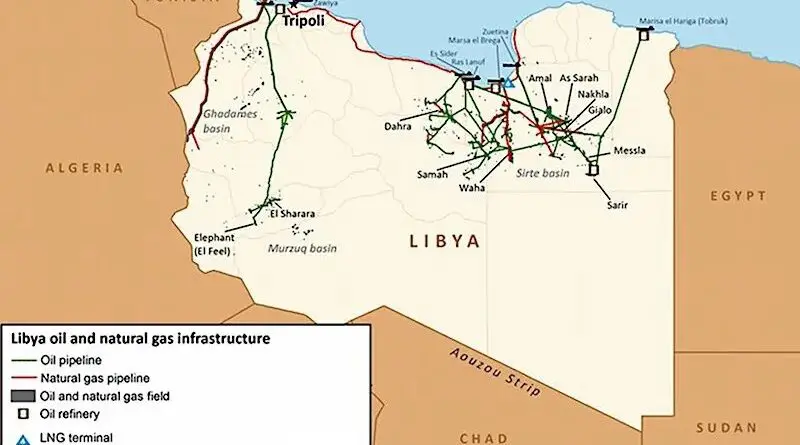Libyan Oil Production Declines By 50% – OpEd
The Waha Company’s production declined by 50% to 145,000 barrels per day, after protesters at the Sidra port prevented oil tankers from entering for the second day in a row; This caused a reduction in the capacity of the port’s oil tanks. Oil production in Libya fell to 700,000 barrels per day in the second half of June, compared to 1,250 million barrels per day before implementing the closures of oil fields and ports by the protesters.
The average price of regular gasoline has topped $4 a gallon in recent weeks in the US, which is nearly 50% more than last year. Natural gas prices have also risen significantly, which has led to an increase in the cost of electricity and home heating.
Libya has retracted its plans to increase oil production to 1.5 million barrels per day in 2022, and this was confirmed by the head of the Libyan National Oil Corporation, Mustafa Sanalla, that the goals of the Libyan oil sector during this year are to maintain the production rates of one million and 200 thousand barrels recorded by the sector last year 2021. We find that Libya has plans to increase, but this is linked to the condition of availability of budgets and political stability.
And that the National Oil Corporation, during the financial crisis, had developed a plan to increase production to reach 1.5 million barrels in early May 2022, but found obstacles and difficulties in financing, as the plans were postponed.
Libya suffered during the financial crisis that year, as the institution obtained 11% of the required budget in relation to the income. It garnered debts amounting to two billion and 953 million and 941 thousand Libyan dinars. As for the liquidation, it reached about 3 billion and 700 million dinars. With the payment of the deficit for the year 2020, only 746 remained from the allocated budget of million dinars, equivalent to only 136 million dollars.
The NOC had only two options at the beginning of 2021; Either surrender to the war and stop production permanently and continue production with the freezing of revenues in the Libyan Foreign Bank until the formation of a new government and therefore protect the entire petroleum sector and that the budget during the year 2021 managed to achieve an increase of 310% in crude production compared to the year 2020, and that the average Libyan oil production In 2021 amounted to one million and 206 thousand barrels per day, despite the difficult conditions and leaks resulting from the deterioration of transmission lines. Production reached 440 million and about 11 thousand barrels, compared to 140 million barrels in the same period; Because of the closures that were exposed to the oil fields and ports. He explained that oil exports from Libya during the past year amounted to 402 million and 969 thousand and 372 barrels, including 342 million and 675 thousand and 508 barrels, the corporation’s share, while the share of the corporation’s partners was 60 million and 273 thousand and 870 barrels, and the amount transferred to local refineries amounted to 33 million. And 925 thousand and 38 barrels, and the amount transferred to the Ubari and Mellitah power stations, 3 million and 994 thousand and 38 barrels.
An attempt to improve the Libyan economy through the Chairman of the Foreign Affairs Committee of the House of Representatives, Yousef Al-Aqoury, worked to support the work of the economic team of the US Embassy by distributing oil revenues fairly; Which will improve the standard of living of the Libyan citizen. The economic team developed economic policies and economic solutions in the short term, which are based on rationalizing spending, enhancing transparency, and covering priorities, and all of this will contribute to the fair and transparent distribution of oil revenues.
Another political attempt by the Prime Minister of the Unity Government, Abdel Hamid Dabaiba, for his supported the efforts of the Special Adviser to the Secretary-General of the United Nations on Libya, Stephanie Williams, to reach the elections as soon as possible. And that elections are the only option for the Libyans, and that Libya needs the efforts of Spain and Europe through the efforts of the United Nations mission in order to come up with the constitutional rule that will be the basis for conducting this national entitlement. We find that there is support from the Spanish ambassador to Libya that supports the efforts of the United Nations to maintain stability and hold elections in respect of the desire of the Libyan people. The Spanish embassy in Tripoli is following up on a number of economic and commercial activities with the private and public sectors in an attempt to return the country to the square of division and wars.

